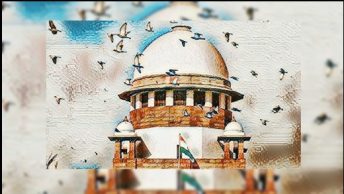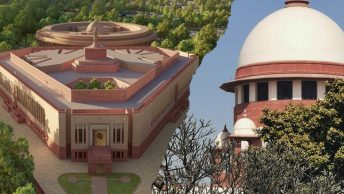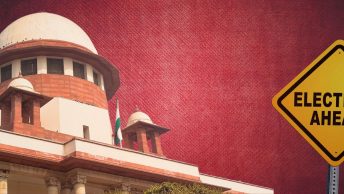Summary: T.M.D Rafi v. State of AP concerns a dispute between the administrative authorities of Mallikarjuna temple and Muslim vendors who have been in the practice of deriving income by setting up shops in and around the temple. In this piece, our analyst, Ameya, provides a summary of the case and delves into the contentions from both sides. After making a comparative analysis of the concerns raised by both sides, an amicable solution is proposed.
Introduction
India’s roots are deeply intertwined with religion. It’s a part of our identity, even as we work towards greater understanding and unity among different communities. The Hon’ble Supreme Court recently resolved the long-standing communal dispute surrounding the Ram Mandir in Ayodhya (M. Siddiq v. Mahant Suresh Das). Now, it is faced with another crucial decision in the case of T.M.D Rafi v. State of Andhra Pradesh concerning non-Hindus’ leasing rights at the Mallikarjuna Temple in Andhra Pradesh.
Mallikarjuna temple holds special significance for Hindu devotees. It’s a place where history and faith merge and is believed to be the site of the divine marriage between Lord Mallikarjuna and Goddess Brahmaramba. The Court’s decision will thus have a profound impact, not only on the temple itself but also on the broader conversation about how India navigates its rich religious diversity.
This explainer piece shall navigate the Mallikarjuna Temple conflict by laying down a brief timeline of the litigious process between the Non-Hindu Tenants (Petitioners) and the State and Temple Authorities (Respondents). Subsequently, a brief summary of the High Court verdict is provided. A discussion of the perspectives of both sides of the dispute follows this. Lastly, the piece concludes with the author’s succinct analysis of the issue, reflecting her personal opinions.
Origin of the Dispute: A Timeline
In May 2015, the Commissioner of Endowments in Andhra Pradesh issued a Government Order instructing non-Hindu occupants to vacate the Lord Mallikarjuna Temple premises in Srisailam. Around that time, nearly a hundred non-Hindu vendors were conducting business within the temple.
In November 2015, the State of Andhra Pradesh amended the A.P. Charitable and Hindu Religious Institutions and Endowments Immovable Properties and Other Rights (other than Agricultural Lands) Leases and Licenses Rules, 2003, giving legal force to the Government Order. The revised Rules explicitly barred non-Hindus from becoming tenants of the Temple.
The rationale was that given the temple’s historical significance, such a move was necessary to protect the rights of Hindus and that the same does not amount to depriving the rights of non-Hindus to carry on any business.
Later that year, Muslim vendors contested the amendment to the Rules at the Andhra Pradesh High Court, asserting that it infringed upon the rights to equality and non-discrimination of non-Hindu vendors as promised under Articles 14 and 15 of the Constitution of India (“Constitution”). The State argued that the amendment aimed to safeguard the interests of Hindu devotees inconvenienced by the worship of non-Hindu deities and the sale of meat, including beef, by non-Hindu vendors. The Temple Authorities asserted that their decision to expel non-Hindu tenants could not be challenged based on fundamental rights violations since it was not a State-owned or managed institution. The arguments of the State and Temple Authorities were upheld by the High Court of Andhra Pradesh in the case of T.M.D Rafi and 15 others v. State of Andhra Pradesh in 2019.
However, the Petitioners then appealed to the Hon’ble Supreme Court, challenging the High Court judgment in 2020. The judgment was then stayed by the Apex Court. In 2021, the Supreme Court passed an interim which disallowed discrimination of vendors on grounds of religion.
The case is currently pending in the Supreme Court before a two-judge bench comprising Justices A.S Oka and Dipankar Datta.
Verdict of the High Court: A Brief Summary
The Hon’ble High Court of Andhra Pradesh considered three primary questions before deciding in favour of the State and Temple Authorities. Firstly, it examined the relevance of determining who is a Hindu and non-Hindu. Secondly, it assessed whether the contested shops formed part of the Temple property. Lastly, it considered whether the orders of the State and Temple Authorities barring non-Hindus from occupying shops violated Articles 14 and 15 of the Indian Constitution.
The High Court delivered the verdict stating that the Petitioners clearly fell outside the definition of Hindus and that the shop areas were part of the temple property. The Judgment also emphasized that the Mallikarjuna temple is not a state-governed institution; the state’s involvement is limited, and auctions and licenses are regulated by the Temple Authorities. More importantly, it opined that while the right to equality under Article 14 is a fundamental right, it is subject to certain limitations. The restriction on non-Hindus was categorized as a reasonable classification under Article 14 of the Constitution and subsequently upheld. The classification was deemed permissible given that the premises align with the definition of a ‘temple’ as stipulated in Section 2 (27) of Act 30 of 1987.
The High Court also reasoned that the “alleged” practices of the non-Hindus, such as beef-selling and the like, would cause great inconvenience to the temple worshippers. Further, a restriction on these practices does not infringe any fundamental right of the Petitioners as such a restriction is well-reasoned. This was because such actions of the Petitioners violated the rights of worshippers of the Hindu deity and thereby caused disturbance to public order.
Further, it was noted that the temple is the sole owner of the property, and it is not under the control of the Government. As a result, the petitioners do not have the right to claim relief based on a violation of Article 14 or 15 of the Constitution of India. Additionally, the Petitioner’s argument on Article 15 of the Constitution was countered by the application of Articles 25 and 26 of the Constitution. The Division Bench pronounced that under Articles 25 and 26 of the Constitution, the Temple Authorities reserved complete authority to decide on the manner in which they profess their religion.
However, on January 18th, 2020, Muslim vendors contested this decision in the Supreme Court. On January 27th, 2020, a two-judge Bench comprising Justices D.Y. Chandrachud and K.M. Joseph issued an interim order staying the High Court judgment. Subsequently, on December 18th, 2021, a two-judge Bench consisting of Justices D.Y. Chandrachud and K.M. Joseph issued an interim order directing that no vendors should be excluded from becoming tenants of the Temple based on their religious identity.
Differing Viewpoints: Economic Necessity v. Religious Beliefs
This dispute, like most communal issues in India, is not easily distinguishable into black or white. Therefore, gaining insight into the perspectives held by each party is crucial for a comprehensive understanding of the origin of the dispute
Non-Hindu Vendor’s Perspective:
It is important to note that regardless of their religion, these non-Hindu vendors had been licensed shop-owners in and around the Mallikarjuna Temple for a long period of time and were never discriminated against based on their religion. Out of the 15 petitioners in this case, most of them solely rely on their earnings from the temple shops and do not have any other sources of income. They have a family to take care of, and having been in this profession for a decent period of time, they have not acquired any other skills. Hence, a judgment against them would drastically impact their financial stability as well as their family’s future.
State and Temple Authorities’ Perspective:
In the communally charged environment of India, religious sentiments often run high. These emotions get more enhanced when an integral part of religious history is attached to the place in conflict. Throughout the High Court judgment, it is elaborately noted that the Mallikarjuna Temple has a dense, rich history attached and, therefore, is a sacrosanct place for Hindu worshippers. The Respondents come from a protective point of view to preserve the richness of their religion. The important question to be answered, however, is whether licensed practice by non-Hindus around the temple is necessarily in conflict with the sacrosanct status of the Temple.
Author’s Opinion
The Judgment delivered by the Hon’ble High Court of Andhra Pradesh was well-reasoned and based on precedents set by the Apex Court. However, depriving the non-Hindu vendors of their only source of income due to religious sentiments is deeply concerning and poses a great challenge to the constitutional rights of the aggrieved. The vendors are not entering the temple to disturb the sanctity that is attached to the place. Instead, they merely wish for their sole source of income to not be disturbed. The right step would be to ban beef-trading and any other practice that causes inconvenience to the worshipper. A complete prohibition, however, is not rationally solicited. It increases the religious as well as economic divides.
Even though the Hon’ble Supreme Court set aside the High Court judgment, the initial ban may have left an indelible mark on the stakeholders, which may lead to hostile sentiments between Hindu and non-Hindu vendors in the future. Such practices should be highly discouraged in a communally charged environment like that of India.
The Apex court has dealt with matters of religious sentiments as in the case of Sri Venkataramana Devaru and Ors v. State of Mysore and Ors. In this case, the dispute was between the Harijans, who sought the right to equality to enter a temple to offer prayers and the Temple trustees who sought to maintain the exclusive right to entry for Gowda Brahmins. One of the contentions that the court dealt with was whether the Harijans had the right to enter all parts of the temple when it was particularly made for the Brahmins. The court harmoniously construed the special rights of Brahmins and constitutional rights of the Harijans in a way that the latter had right to enter the temple. However, they could not enter certain restricted areas which were available for exclusive entry to Brahmins. This restriction was held to be constitutional as under Article 26 and Article 25(2)(b) of the Constitution. At last, to resolve this conflict, the Court struck a highly intelligent compromise in allowing the Temple Trust to carve out certain exceptional occasions on which the restriction to enter temple on Hindus other than Gowda Brahmins may be held valid whereas temple entry for all was held to be the norm. This way, the deity maintained its sanctity, and the Harijans were able to offer their prayers.
A similar compromise should be struck in the present case wherein the rights of non-Hindu vendors to license shops and participate in auctions should be protected. Beyond this right, they must not be allowed to inconvenience the Hindu worshippers in any manner, and strict action should be taken if any malpractice is found. This way, the Mallikarjuna Temple will maintain its sacrosanct nature while the non-Hindu vendors will not be robbed of their only source of income.
Conclusion
The Mallikarjuna Temple dispute highlights the intricate conflict between religious sentiments and Fundamental Rights in India. While protecting the sanctity of religious spaces is paramount, it cannot come at the expense of marginalizing individuals based on faith. Perhaps, inspired by the compromise in Sri Venkataraman Devaru, a solution can be found that safeguards the temple’s sacredness while ensuring opportunities for all, regardless of religious affiliation. Moving forward, fostering open dialogue and building bridges of mutual respect between religious communities is crucial.
Ameya Sharma is a second-year law student at NALSAR University of Law, Hyderabad.





